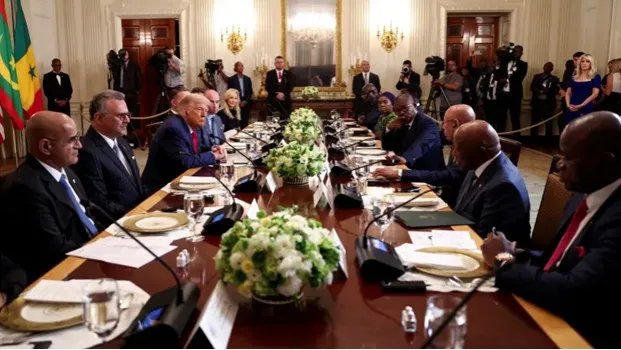
The Trump administration is facing growing backlash from human rights organisations and African civil society groups over what critics describe as a deliberate strategy to use African nations as a “dumping ground” for foreign criminals who have served time in the United States.
The controversy erupted after a deportation flight from the US landed in Eswatini on July 16, carrying five men—originally from Vietnam, Jamaica, Laos, Cuba, and Yemen—all convicted of serious crimes in America.
The move forms part of President Donald Trump’s “third country” deportation plan, a policy that targets individuals whose home countries have refused to repatriate them.
This marks the second such transfer to the African continent in less than a month. Earlier in July, eight individuals labelled as “uniquely barbaric monsters” were deported to war-ravaged South Sudan.
Human rights groups have condemned the policy as a violation of international norms and an affront to African sovereignty.
“The US government sees us as a criminal dumpsite and undermines Emaswati [the people of Eswatini],” said Wandile Dludlu, deputy president of the banned opposition group PUDEMO, speaking to Al Jazeera. “This is attracting indignation from Emaswati for naked abuse of their sovereignty and territorial integrity as a nation and people.”
US Homeland Security official Tricia McLaughlin defended the move, stating the deportees had committed acts ranging from child rape to murder and gang-related homicides.
“These depraved monsters have been terrorizing American communities but thanks to [Trump] they are off of American soil,” she posted on X.
Though Eswatini officials confirmed cooperation with the US and the International Organisation for Migration (IOM), they offered few details about timelines for repatriating the men to their original countries.
“There are no timelines at present,” said government spokesperson Thabile Mdluli.
Activists argue that Eswatini, a small monarchy under King Mswati III, lacks the infrastructure to accommodate such prisoners. The kingdom’s prisons already operate at 170 percent capacity, and critics warn that the influx could worsen dire conditions.
Daniel Akech of the International Crisis Group said some African governments are accepting these transfers as a “goodwill gesture” to remain in Trump’s favour, often at the cost of transparency and human rights.
“The African Union and the UN should step in to ensure these deportees are protected,” he urged.
In Eswatini, public sentiment has been sharply critical.
“This distasteful and fraudulent conduct by His Majesty and his government comes at a time when we are facing an unprecedented public healthcare crisis,” said Dludlu. Legal threats have been issued by civil groups, who argue the detentions breach the country’s Correctional Services Act.
Trump’s administration has reportedly discussed similar agreements with Senegal, Liberia, Guinea-Bissau, Mauritania, and Gabon. While Rwanda has confirmed ongoing talks, Nigeria has rejected such proposals.
Internationally, the US joins countries like the UK and Israel in pursuing third-country deportation policies—often with Africa as the target destination.
Analysts warn these deals represent an alarming trend in “outsourcing” migration problems at the expense of less powerful nations.
Foreign policy expert Chris Ogunmodede noted, “Eswatini and South Sudan are smaller economies with no geopolitical weight—easy targets for an administration looking to flex its will on the global stage.



